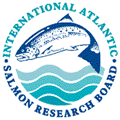SALSEA Programme
The SALSEA Programme
SALSEA was an international programme of co-operative research, adopted in 2005, designed to improve understanding of the migration and distribution of salmon at sea in relation to feeding opportunities and predation.
SALSEA contained a comprehensive mix of freshwater, estuarine, coastal and offshore elements, ensuring a thorough overview of factors which may affect the mortality of Atlantic salmon and the opportunities to counteract them. It differentiated between tasks which can be achieved through enhanced co-ordination of existing ongoing research, and those involving new research for which funding is required. SALSEA comprised four Work Packages: supporting technologies; early migration through the inshore zone; investigating the distribution and migration of salmon at sea; and communications.
Under SALSEA, the following marine surveys were conducted:
- SALSEA Merge, in the North-East Atlantic;
- SALSEA North America, in the Northwest Atlantic; and
- SALSEA West Greenland, enhanced sampling at West Greenland.
The NASCO / ICES ‘Salmon Summit‘ allowed for the review of the findings of this research.
Following a review of research priorities, the Board endorsed the need for an international acoustic tracking programme and adopted a Resolution (ICR(14)10) encouraging Parties to continue the development of local collaborative telemetry projects, encouraging the development of large international collaborative projects building on local efforts and encouraging Parties to make efforts to identify funding sources.
The Board agreed to support SALSEA-Track as a continuing commitment to understanding the factors affecting mortality of salmon at sea.
